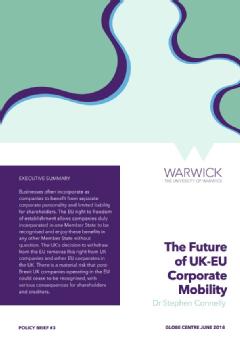UK companies need to act now to prepare for the loss of the EU right to freedom of establishment, advises Warwick legal expert
 The third paper in a new GLOBE Centre Policy Brief Series is published today.
The third paper in a new GLOBE Centre Policy Brief Series is published today.- The Future of UK-EU Corporate Mobility explores the risk that, after Brexit, UK companies operating in the EU could cease to be recognised by their host nations.
- This could lead to contracts and claims being deemed unenforceable.
- Shareholders could become exposed to unlimited personal liability.
- Businesses with an EU presence, their shareholders and their creditors should act now to understand the risks.
The third in a new series of briefs bringing current legal thinking to bear on public policy issues has been published by GLOBE, a research centre within the University of Warwick’s Law School.
The Future of UK-EU Corporate Mobility, by Dr Stephen Connelly (pictured), Associate Professor at Warwick Law School, explores the possible consequences for UK companies of the loss of the EU right to freedom of establishment, and recommends actions that companies, their shareholders and creditors should take now.
Freedom of establishment allows companies incorporated in one member state to be recognised, and to enjoy the benefits of incorporation, in any other member state without question. Withdrawal from the EU removes this right from UK companies, and from EU companies operating in the UK. Dr Connelly estimates that in Germany alone more than 1,000 UK companies could be affected.
Dr Connelly’s paper sets out three scenarios which UK companies with an EU presence should prepare for:
-
The company is deemed to be a local company and must comply with local corporation law. If it is not compliant, members of the company would be personally liable.
-
The company is deemed not to exist in a legal sense and is re-characterised as a partnership. Shareholders become partners with unlimited personal liability.
-
The company is recognised legally but must meet additional conditions such as greater capital requirements or a license to operate.
Dr Connelly comments: “It might seem extraordinary that a company could simply be deemed not to exist, but with loss of corporate mobility rights after Brexit this is a real risk. In Germany alone there are over 1,000 UK corporates at risk.”
Dr Andreas Kokkinis, Assistant Professor at Warwick Law School and editor of the briefing series, said: ‘‘Dr Connelly raises the pertinent issue of the recognition of UK companies and other legal entities operating in EU Member States post-Brexit and vice versa, and identifies the legal risks that exist in this regard.
“His paper illustrates these risks by analysing three potential scenarios of corporate mobility and the impact that Brexit could have on the recognition of the legal status of the relevant bodies corporate.”
GLOBE intends to publish around four papers a year on topical issues. Previous papers in the series explored the regulatory impact of the UK’s withdrawal from the European Union on the UK’s financial services sector, and the consequences of Brexit for intellectual property laws and policies, and the UK’s ability to influence European and international norms in this field.
The policy briefs are each available online. There will also be a limited print run of each policy brief in the series.
7 June 2018
Dr Connelly is Associate Professor of Law at the University of Warwick and a solicitor in England and Wales. He specialises in corporate and financial law and has five years PQE as a solicitor in structured finance and financial regulation litigation. Stephen provides consultancy advice on financial matters to civil society and public bodies and publishes regularly on the subject.
The Centre for Law, Regulation and Governance of the Global Economy (GLOBE) at Warwick Law School, created in 2014, is a research and public engagement centre that brings together staff and postgraduate students working in international economic law, business and commercial law, corporate governance and financial regulation.
The aim of the GLOBE policy brief series is to improve the factual base on which policy decisions are made and share cutting-edge academic research in an accessible and relevant manner with policymakers, the media, civil society groups and the general public.

